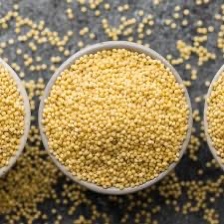
Millet is a cereal grain that belongs to the Poaceae family also known as grass family. It is commonly grown in Africa and Asia and can be used for both human consumption, livestock and bird feed. It is gluten free and high in protein, fiber and antioxidants. It is also rich in carbohydrates, minerals and vitamins, and provides essential amino acids when compared to other cereals.
However, it should not be taken in excess and it can prevent the body from absorbing nutrients from other meals. That aside, there are some health benefits that can be derived from taking it as seen below:
1. Controls blood sugar levels:
Millets are rich in fiber and non starchy polysaccharides that helps control blood sugar levels. It also has a low glycemic index (GI) which means that it is unlikely to raise your blood sugar levels and therefore an ideal grain for people with diabetes. It also increase insulin sensitivity for people suffering from diabetes.
Read Also: Health Benefits of Cloves
2. Lowers cholesterol:
Millet contains soluble fiber which produces a viscous substance in your gut that helps trap fat and reduces cholesterol levels. The millet protein also can lead to a decrease in triglyceride levels and significantly increase the adiponectin and good cholesterol levels. The adiponectin is a hormone that stimulates fatty acid oxidation.
3. Rich in antioxidants:
Millets are rich in phenolic compounds especially ferulic acid and catechins which act as antioxidant to protect that body from harmful oxidative stress. The catecins bind to heavy metals in the blood stream to prevent metal poisoning.
4. Help in weight loss:
Millets contain tryptophan, an amino acid and is high in fiber which lower appetite and helps in managing weight. It digests at a slow rate and keeps the stomach full for a long period of time consequently preventing over eating.
Read Also: Health benefits of Water melon
5. Reduces risk of cancer:
Millet contains phyto nutrient and fiber which is believed to reduce the risk of developing colon cancer. Lignan, a phyto nutrient in millet is converted to mammalian lignan in the intestine which protects from breast cancer.
6. Improves skin elasticity:
Millet is rich in amino acid such as L-lysine and L-proline which help to create collagen in the body, a substance which gives structure to the skin tissue thus making it less prone to wrinkles.
7. Slow down muscle degradation:
Millets are high in protein and contains lysine and amino acid which slows down muscle degradation and helps to build the leaner muscles.
8. Good for celiac disease patients:
Millet is a gluten free grain which makes it a good choice for people with celiac disease. Celiac is a disease which damages the small intestine and interfere with the digestion of nutrients from food. Although, gluten is a protein that occurs naturally in grains like wheat or barley. Those with celiac disease often avoids gluten diet because it triggers harmful digestive symptoms such as diarrhea and nutrient malabsorption.
